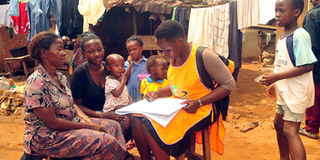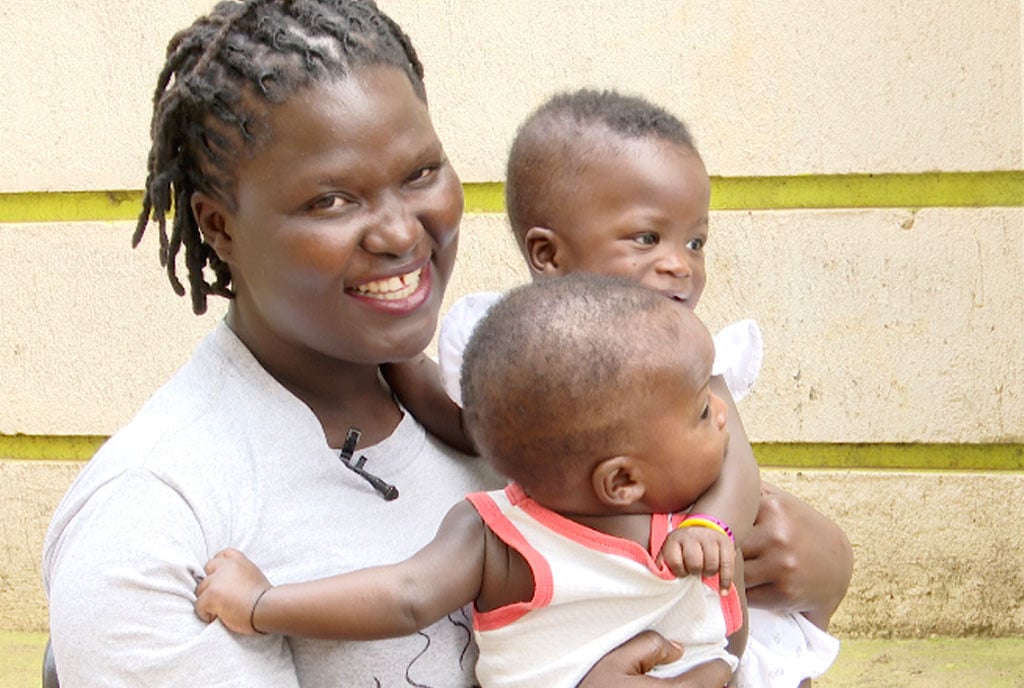Prime
Taking stock of Uganda’s 10th census in history

A family in Kibuli, a Kampala suburb, is counted after Ubos extended the enumeration period.
What you need to know:
Numbers. Although some citizens, especially on social media, claim the enumerators never reached them, Ubos insists 97 per cent of the country was covered in the just concluded National Housing and Population Census. We look at the challenges, the costs and the relevance of the census to the planning bodies.
After being called off twice in as many years due to lack of funds, the population and housing census eventually took place.
And after 13 days of enumeration, Uganda Bureau of Statistics (Ubos) last week closed the exercise with at least 200 people arrested by police for allegedly refusing to be counted or sabotaging the national exercise that will cost the tax payers about Shs200 billion.
Initially, the counting was planned for 10 days, but due to slow start, the statistics officials were compelled to extend it by three more days.
The Ubos Executive Director, Mr Ben Mungyereza, and the Census National Coordinator, Mr Francis Mashate, estimate that at least 97 per cent of the country has been covered, an approximation they said is perfect to inform proper decision making and planning.
But that didn’t come easy as the statistics bureau had to grapple with several difficulties, some of which were down to poor planning and others were beyond the bureaus’ control.
Start of exercise
In the early days of enumeration, most enumerators across the country started work hours after the stipulated time. This was mainly because the foot soldiers - enumerators - were provided with census materials late despite earlier confirmation by Mr Mashate that all was set.
Soon, the statistics bureau was hit by resignations of several enumerators, especially in Kampala and Wakiso districts as many more across the country threatened to lay down their tools, citing poor facilitations and deployment schedule.
It is understood that at least 100 enumerators either laid down their tools or simply quit, although according to Mr Mashate, the combined number of those who were dismissed, quit or laid down tools was no more than 50.
In some areas of West Nile, internal borders conflicts didn’t help matters either and so are the cult members, especially in parts of central region, who equate enumeration to a grave sin. Most of the 200 people that Mr Mungyereza said were arrested in connection to the exercise were members of the cult.
The timing of the census coincided with somewhat rainy season. Throughout the census period, including the extended days, it would rain at the peak hours when most people, particularly in urban areas, were at home. This hindered the movement of the enumerators and generally slowed the exercise.
Covered
Despite all that, the bureau managed to cover 97 per cent of the country with the extended days not turning in the kind of results that was expected.
Speaking at a news conference last week in Kampala, Mr Mungyereza said information that was collected in the extended days was not significant at all to merit additional days for enumeration.
“We have faced so many difficulties,” Mr Mungyerza said last week in an interview with the Daily Monitor.
He continued: “It took our inner resolves to ensure that this exercise happens. And I have no regret that we have done an excellent job.”
He said his field staff encountered numerious challenges, including; intimidation, assault, lack of cooperation and sheer arrogance by a section of households, all making the exercise a nightmare.
Coupled with what Mr Mashate referred to as population explosion, it had to take hard work and commitment to see through the exercise. The statistics bureau earlier estimation particularly in urban areas, proved devastating as some areas had undergone population explosion, meaning an area which previously had about 20 households, had now multiplied by the same number of households.
When that was discovered, Mr Mungyereza said reserved enumerators, whose number were about 80, were employed in those massively populated urban areas.
Social media
Meanwhile, a quick mini survey in a social media showed that out of 10 people at least half that number was either not enumerated or not happy with the way the exercise was conducted.
In response, the Ubos manager Communication and Public Relation, Mr Godfrey Nabongo, said such indications drawn from the social media should be taken with a pinch of salt for it is not the accurate reflection of what is on the ground.
However, Mr Mungyereza was more candid. He said: “It is your responsibility to ensure that you are counted. Make yourself available and you will be enumerated.”
He continued: “Many of those ranting in the social media platforms could have been counted only that they don’t know that. You don’t have to be at home to be counted. For example, I was not at my home when I was being counted.”
But the bottom line, according to the statistics prefects, is that what has been collected thus far irrespective of those who have missed out is enough to predict accurate figures of the population and housing statistics.
In an interview with Mr Corti Eliab Paul Lakuma, a research analyst with Economic Research Centre (EPRC) on Friday, it emerged that all is good to go. He said: “With the 97 per cent of the country covered, the results of the census will be accurate no matter those who have not been enumerated.”
He continued: “Ubos has good experimental scientific models that can be used to correctly determine the census results. I know every model has its weaknesses but in this case I don’t think the margin of error will go beyond +2.”
However, he was also of the view that UBOS issues a toll free line that those who have not been enumerated can call so as to have their details captured as well.
Need for accurate results
The director development planning at the National Planning Authority, Mr Patrick Birungi, said in an earlier interview that his organisation which is charged with planning for this country is desperate for accurate figures for without them the outcome decisions informing polices will be overtaken by events even before being implemented.
The Private Sector Foundation (PSFU) director for policy and advocacy, Mr Moses Ogwal, said census will not only benefit government but also the private sector and as such they expect nothing short of accurate information irrespective of what could have gone wrong.
what it means to have an accurate census
According to Uganda Bureau of Statistics executive director, Mr Ben Paul Mungyereza, the outcome of the census could trigger development across economic sectors, especially if the information is used to aid production and marketing decisions.
He said: “Allocation will not happen in vacuum but there will be indicative figures that even government will be using before making a decision.”
Planners, both for public and private sector will be among the biggest beneficiaries once the results are declared. This is because after the exercise, the population figures, poverty levels and the details of any area in Uganda will be available for planners and private sector to refer to.
The director development planning at the National Planning Authority, Mr Patrick Birungi, said in an interview that his organisation, which is charged with planning for this country, is nothing without credible statistics. The planning authority needs to understand the number of people it is planning where to start or base their planning from. And this can only be answered by census.
Mr Fred Muhumuza, an economic analyst, said in an interview that the data that the census will generate will be crucial for determining informed decisions regarding business and investment.
He said: “Information such as the structure, settlement, and health facilities, among others, will be provided in which credible decisions can be arrived at. This is because in the last 12 years, when the last census was held so many things have happened. And it is this exercise that will give an accurate picture of the transformation made thus far.
And going by the consensus of the aforementioned experts and analysts, should the outcome of the census turned out to be misleading then the whole economic sector of the country will crumble as it will not be able to hold on a shaky foundation—statistics.
The minister of State in charge of planning, Mr Matia Kasaijja, has already sounded a warning to the statistics prefect that he will not tolerate inaccurate census report—figures.
Asked about how much money was been pumped in the census, Mr Mungyereza said: “Between the financial year 2008/2009 to 2013/2014 we have used about Shs100 billion. This financial year we have been given Shs90 billion and in the next financial year we shall get about Shs9 billion. So in total, we shall spend about Shs200 billion.”
About the census
The census started on the night of August 27 and it will proceed till September 06, 2014.
The census exercise covered in 13 in total
It involved Door to Door, Interviews with Household Head during the Day time only to all Persons who spent the Census Night of August 27, 2014 in the country.
Publication of Provisional Results will be in October 2014
This is the 10th census to be conducted in Uganda, the 5th after Uganda gained her Independence and the 2nd to be conducted by the Uganda Bureau of Statistics.
The census started on the night of August 27 and it will proceed till September 06, 2014.
The census exercise covered in 13 in total
It involved Door to Door, Interviews with Household Head during the Day time only to all Persons who spent the Census Night of August 27, 2014 in the country.
Publication of Provisional Results will be in October 2014
This is the 10th census to be conducted in Uganda, the 5th after Uganda gained her Independence and the 2nd to be conducted by the Uganda Bureau of Statistics.
The numbers
10
The number of days that the Ubos directors had initially scheduled the census to take.
13
The number of days that the census took after Ubos added more days for enumerators to cover other areas.
97
The percentage coverage of this year’s census.
100
The number of enumerators that reportedly laid their tools for various reasons although Ubos puts the number at 50.
200
The number of people that were arrested for refusing to be counted because of their cult beliefs.
Shs200b
The amount of money that the census will cost the government by the end of the exercise.




